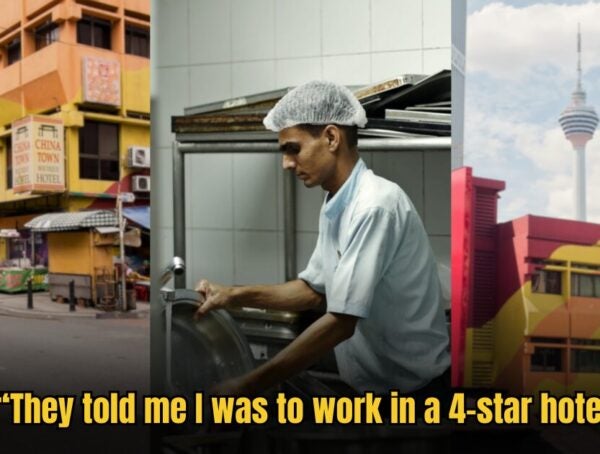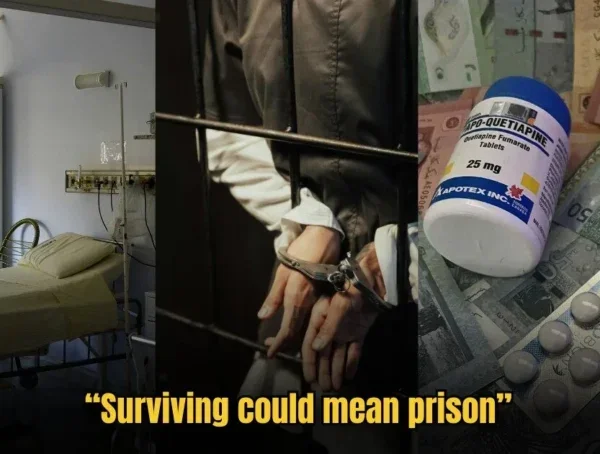Disclaimer: In Real Life is a platform for everyday people to share their experiences and voices. All articles are personal stories and do not necessarily echo In Real Life’s sentiments.
Subscribe to our Telegram for updates.
Borderline personality disorder (BPD) is a psychological condition that affects at least 1.6% of people.
People who suffer from BPD find it difficult to control outbursts of emotion such as anger, sadness, or fear. This causes serious issues in their relationships with others.
IRL reached out to Beanie to share her story of what it’s like to live with a sister who has Borderline Personality Disorder for 25 years.
I grew up in a family of 3 sisters.
Rie was the eldest, Lex was the middle child, and I was the youngest.
Fights blew up a lot between my parents and sisters. They weren’t simple disagreements, but emotionally charged ones where the aftermath would leave us shaky and in a daze for the rest of the day.
As 3 sisters who were constantly compared to each other, we picked on one another and tried to be noticed by our emotionally distant and manipulative dad. His validation meant the world to each of us. As such, the house was in constant chaos.
Rie, the eldest, was always expected to be the responsible one, so she grew to become the most level-headed one out of all of us.
I was the youngest, so I was the anak manja (Golden Child), as they would say. Admittedly, I was treated the most gently by my parents.
That left Lex, the middle child, who became known as the “Drama Queen”. She began to get many nicknames growing up: “Sensitive”, “emotional”, and “crybaby”.
Although we had a lot of fights, I still loved my sister. But I never thought how deep a wound this childhood would have had on Lex.
When I noticed that my sister was competing with me
It started off with a voice recording.
I had just started to enjoy singing, a hobby which Lex had started before me. Unlike Lex, I was shy about performing to others. I’d only just begun practising to myself; I wasn’t ready to have my voice criticised by others.
One evening, my best friend had come over for a sleepover, and she was hanging out with me and Lex. When I went to the toilet, I came back to find Lex playing a recording to my friend. But it wasn’t my voice.
My friend burst out laughing, “Was that really you?” I begged her to believe that it wasn’t me, but I could only hear them laugh.
It turned out that my sister had made a fake recording of me singing using her own voice – a cruel prank to ridicule me in front of my best friend. Ashamed and feeling betrayed, I didn’t touch singing again until I was 17.
At the time, I thought my sister was cruel and vindictive. But looking back, I realise she thought I was competing with her.
Her need to be known for something, even if it was being “The Singer” of the family, was so great that she couldn’t share that hobby with others – even her little sister.
My sister can be extremely sabotaging

At the age of 17, Rie had the chance to study abroad, and she thought of it as a ticket out of Malaysia. She excitedly talked about how she wanted to bring us over one day when she was financially stable, and raise us if she got the chance.
Lex was against it from the start. My parents had separated by then, and Rie had moved into her own place while dad lived with grandma. That meant only Lex and I were living with my mom.
She persuaded Rie to stay. “We all need you here, Rie. You’re an integral part of keeping what was left of the family together.”
Rie, being the responsible one, was convinced and she gave up a life abroad to stay with us.
A few years later, when Lex herself turned 17, the opportunity to go abroad passed on to her. Rather than refuse the offer, she accepted in a heartbeat.
What happened to “staying in Malaysia to keep the family together”?
It was an eye-opening moment for me and Rie. Neither of us knew how sneaky she was until she went behind our backs. We had to find out from Mum, who was closest to her.
But whether it was fate or karma, we faced financial issues shortly after and Lex never got to go abroad. That didn’t mean that things slowed down. If anything, it only got worse.
I started realising a pattern with Lex’s behaviour
Since it was just me and Lex living together with our mum now, my relationship with her grew shakier.
Lex had a habit of telling extravagant adventures, clearly fabricated from the most mundane daily occurrences, to the point she would outright lie to keep up appearances.
She would lie to me about how much money she was giving Mum, or how much she was earning.
Once, she lied to her online friends about having to be admitted into the hospital after a “heart attack” to gain sympathy from them. It was as if she believed that embellishing the truth would make her life more interesting.
On most days, I let it slide, but it became a problem when we started fighting for the only computer in the house.
At the time, I needed the computer for a college project, but Lex pleaded with me that she needed it for an online class. Later, I found out that she was using it to play video games!
Stressed with semester deadlines, I was a ticking time bomb. The ensuing fight escalated into a screamfest that almost got physical.
It got so bad that she moved out to live with my grandma. Seeing her leave was hard, because I missed my sister.
Every time I went to visit my grandma, I always felt a bittersweet feeling of wanting to see Lex. But I knew we would only fight, so I would drop by quickly so as to not bump into her.
It’s weird hating someone, yet wanting so desperately to love them. But my pride got in the way, and I couldn’t find it in me to reach out to say anything to mend the relationship.
Despite our differences, my sister was there for me when I got a bipolar disorder diagnosis.

Some time later, I found out from my mum that Lex had gotten herself diagnosed by a psychiatrist with Borderline Personality Disorder and was receiving therapy for it.
I didn’t think much of it, only that it seemed like the kind of thing she would do – invent a disease in order to gain sympathy from others.
But life took a strange turn when I myself got diagnosed with Bipolar Type II a few years after Lex’s diagnosis.
At the time, I had a rough rollercoaster of a year and I was suffering terribly from the burnout.
I was at my lowest point. I didn’t think anyone, not my sisters, my parents, or my best friends could have helped me get out from the chaos that I was going through.
Surprisingly, it was Lex who reached out to me. She urged me to seek professional help.
Not only that, she followed me to the therapist, sat down in the waiting room with me, and took me out for coffee and cake. It would become our routine after every session.
Lex shared what having Borderline Personality Disorder was like
After years of not speaking to her, sitting across from Lex and having cake, there was warmth in the silence.
It was in those quiet moments that Lex started opening up about how she felt about having Borderline Personality Disorder.
She told me about how, when she got diagnosed with Borderline Personality Disorder a few years ago, she felt like she was a walking red flag.
Everyone in the family had mocked her because she was emotionally sensitive, when she herself didn’t know why.
Even after the diagnosis and treatment, she found that she didn’t receive the support she needed because nobody understood her.
“I was so sure that everyone was out to get me, so I thought I had to adopt toxic defence mechanisms to save my own sanity,” she told me.
As she spoke to me, it brought me back to all the times she hurt me and Rie – how she made my friend mock my singing when it was her pretending to be me in the recording, how she manipulated Rie to stay in Malaysia, her tendency to tell tall tales, and of course, being called the “Drama Queen”.
Talking to her helped me better understand her perspective of things. Though I do wonder if she’s honest with me, I realised then that she was trying to be better.
At that moment, I forgave her for all the hurt she caused me in the past. Now, although we don’t talk as much as we used to because of our busy schedules, when we do, the love is evident.
3 things I learnt from having a sister with Borderline Personality Disorder
BPD (Borderline Personality Disorder) is a mental illness that some consider to be incurable, because it has become part of someone’s personality.
Here are some signs to look out for if you suspect your loved one has borderline personality disorder:
- Distorted Self-Image and Identity Issues: People with borderline personality disorder may have trouble understanding who they are, what they value, or what their goals and aspirations are. This can lead to feelings of emptiness, confusion, and a constant need for validation from others.
- Impulsive and Self-Destructive Behaviours: People with borderline personality disorder often engage in impulsive behaviours like reckless driving, substance abuse, excessive spending, binge-eating, self-harm, or suicidal gestures. These impulsive actions are often driven by a desperate need to alleviate emotional pain or to feel a sense of control.
- Intense and Unstable Relationships: People with borderline personality disorder often struggle with maintaining stable and healthy relationships. They may experience intense and rapid shifts in their feelings towards others, resulting in a pattern of idealising someone one moment and then devaluing them the next. This emotional instability can lead to frequent conflicts and difficulties in maintaining long-term relationships.
BPD is a serious mental illness, and many remain undiagnosed and suffer in silence every day. This can lead to severe depression and loss of hope for a happy life.
About 70% of people with BPD will make at least one suicide attempt in their lifetimes. However, BPD is not a death sentence. Almost 88% of people who were once diagnosed with BPD will recover after 10 years.
If you have a loved one who has symptoms of BPD, have hope. You can start stepping up for your loved one by noticing and recognising the signs and asking them to seek help together.
For more stories like this, read:
5 Reasons Why Asian Families Don’t Talk About Mental Health
Do you have an interesting story? Email us at ym.efillaerni@olleh.
You might also like
More from Real Mental Health
“I Was Scared of Waking Up in Handcuffs,” shares Depressed M’sian on Repealed Law
In 2023, Malaysia repealed Section 309, a colonial-era law that made suicide attempts a crime. The change marked a shift …
‘Everyone Saw A Successful Student While I Was Crumbling,’ Shares 22 Year Old Student
This is a story of a 22 year old woman who shared her story as a Straight A’s student as …
5 Harmful Mental Health Myths Malaysians Still Believe
Let’s break down five of the most common myths Malaysians still believe, and why it’s time to let them go.


















